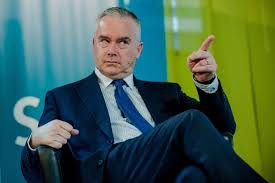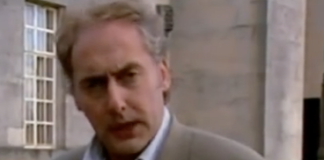- Opposites attract - 26th February 2026
- Upset coffee - 25th February 2026
- Not acting the part - 24th February 2026
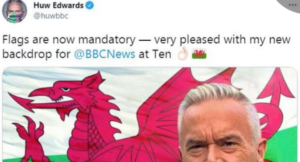 Prominent Welsh television newsreader Huw Edwards, being ordered to drop a post of himself in front of a Welsh flag which he declared was a “backdrop for @BBCNews at Ten”, once again shows how rules on neutrality are flouted when they have been emphasised by his superior.
Prominent Welsh television newsreader Huw Edwards, being ordered to drop a post of himself in front of a Welsh flag which he declared was a “backdrop for @BBCNews at Ten”, once again shows how rules on neutrality are flouted when they have been emphasised by his superior.
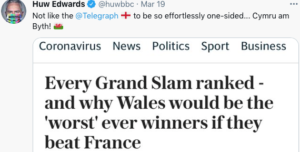 The controversial ‘flag’ tweet by Mr Edwards came after a flurry of pro-Wales activity on his Twitter page before Saturday’s international rugby match against France, when he stepped in following the current performance of the Welsh rugby team was being criticised in The Daily Telegraph.
The controversial ‘flag’ tweet by Mr Edwards came after a flurry of pro-Wales activity on his Twitter page before Saturday’s international rugby match against France, when he stepped in following the current performance of the Welsh rugby team was being criticised in The Daily Telegraph.
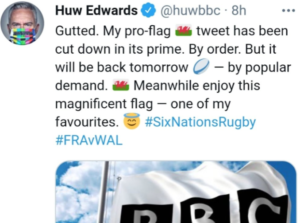 “Every Grand Slam ranked – and why Wales would be the ‘worst’ ever winners if they beat France”, ran the newspaper’s headline, to which Mr Edwards responded with heavy irony: “Not like the The Telegraph to be so effortlessly one-sided… Cymru am Byth!”
“Every Grand Slam ranked – and why Wales would be the ‘worst’ ever winners if they beat France”, ran the newspaper’s headline, to which Mr Edwards responded with heavy irony: “Not like the The Telegraph to be so effortlessly one-sided… Cymru am Byth!”
Using social media on the eve of the game (when during it, the rugby punditry of his BBC colleague Jonathan Davies was attacked on social media), Mr Edwards proclaimed: “Gutted my pro-flag tweet has been cut down in its prime. By order. But it will be back tomorrow – by popular demand. Meanwhile enjoy this magnificent flag – one of my favourites. Hashtag SixNationsRugby Hastag FRAvWAL” – with a series of emojis included.
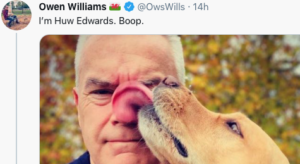 Before the gripping game a supporter of his shared a series of pictures on Twitter (including one of Mr Edwards being licked by his dog), which he showed his approval of, by saying: “Share the love this epic thread was the tonic I needed – before kick off”.
Before the gripping game a supporter of his shared a series of pictures on Twitter (including one of Mr Edwards being licked by his dog), which he showed his approval of, by saying: “Share the love this epic thread was the tonic I needed – before kick off”.
However his announcements have not been met with wild acclaim by the leader of the Welsh Conservatives in the Welsh Parliament/Senedd Cymru (WP/SC) Andrew RT Davies, who has said on Twitter that The BBC was: “Employing presenters who openly mock… (Britain)… Ridiculous!”, and linked it to the ‘Gutted’ post.
 But these messages fall into a familiar pattern, and in an earlier post Mr Edwards had endorsed, too, an opinionated columnist who said she was a “Welsh woman” and that the BBC Proms made her feel like a “foreign tourist”.
But these messages fall into a familiar pattern, and in an earlier post Mr Edwards had endorsed, too, an opinionated columnist who said she was a “Welsh woman” and that the BBC Proms made her feel like a “foreign tourist”.
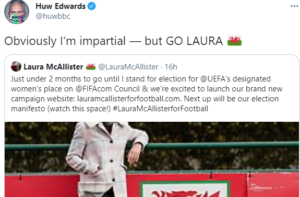 He had backed controversial writer and academic Laura McAllister’s Twitter announcement that there was less than two months before she stood for election to a football governing body’s council.
He had backed controversial writer and academic Laura McAllister’s Twitter announcement that there was less than two months before she stood for election to a football governing body’s council.
Mr Edwards declared, initially again ironically: “Obviously I’m impartial —- but GO LAURA” with a Welsh flag after the comment.
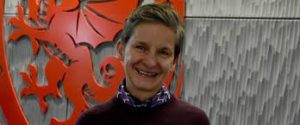
Yet six years ago (well before the row over how the proms are presented), Ms McAllister had written in her regular Welsh newspaper column: “I do realise that my national identity has been shaped and expressed largely through sport, but the Proms’ Union Jack waving (albeit with a smattering of European, Welsh and Scottish flags mixed in) and Rule Britannia make me feel like a foreign tourist”.
However by supporting Ms McAllister so publicly and using social media to emphasise his defence of all things Welsh, Mr Edwards has apparently posed a dilemma for his overall boss, The Director General of the BBC, Tim Davie, who was clear in his guidance that issues of neutrality are paramount – especially when impartiality is under attack worldwide.
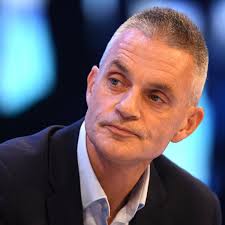
Mr Davie will be aware of the pressure he is under because of recent opinion polls, and that it is crucial his presenters are neutral, because, in Mr Edwards’ case, some may disagree with his views on Wales, and they do, of course, pay his wages.
The BBC rules declare: “If your work requires you to maintain your impartiality, don’t express a personal opinion on matters of public policy, politics, or ‘controversial subjects’”.
They also state that staff should avoid using disclaimers such as ‘My views, not the BBC’s’ in their biographies and profiles, as they provide no defence against personal expressions of opinion.

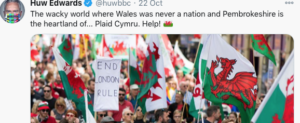 These recent comments on social media, though, are not the first time that Mr Edwards has made his opinions plain, once more putting him at odds with the rules.
These recent comments on social media, though, are not the first time that Mr Edwards has made his opinions plain, once more putting him at odds with the rules.
He was accused of political bias, after he ‘liked’ a tweet saying: “Vote Labour for the National Health Service”.
Another Tweet he published again seemed to go against the guidelines, highlighting as it did (once more ironically): “The wacky world where Wales was never a nation and Pembrokeshire is the heartland of… Plaid Cymru. Help!”.
![]() The picture he attached underneath it, was of protesters carrying Welsh flags aloft with a placard of END LONDON RULE clearly visible near the centre of the photograph.
The picture he attached underneath it, was of protesters carrying Welsh flags aloft with a placard of END LONDON RULE clearly visible near the centre of the photograph.
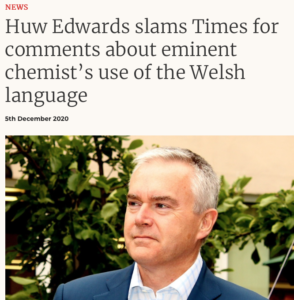 Only last month he attacked a critique of the break-up of the UK by historian and journalist Max Hastings, who he claimed had made “errors” in his article.
Only last month he attacked a critique of the break-up of the UK by historian and journalist Max Hastings, who he claimed had made “errors” in his article.
Mr Edwards’ comments in support of Wales, or the Labour party, are often seized on by a headline-grabbing nationalist website which is backed by the taxpayer.
After his diatribe opposing Mr Hastings, contentious Nation.Cymru (NC) published a ‘news’ piece saying: “Huw Edwards slams former Telegraph editor for anti-Welsh language article”.
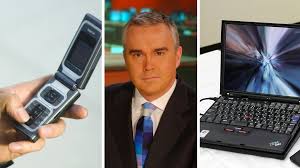
Following the remark about Plaid Cymru (PC) it ran a ‘story’ that: “Broadcaster Huw Edwards has protested the BBC’s new rules on using social media by unleashing a cascade of Welsh flags”.
But the Editor of NC, Ifan Morgan Jones, is himself controversial, and has been in trouble for accepting an advert from the Bangor University’s (BU) journalism course that HE teaches on, which critics claimed was a blatant conflict of interest. They have also stressed the disturbing fact that teaching ‘journalism’ in this context appears odd when being unbiased is an important part of reporting.
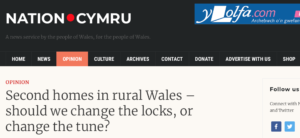 One NC ‘news’ piece said that: “The county of Gwynedd in the north-west has seen the largest collapse in consumer spending as a result of Covid-19 in both Wales and England, according to business data”, while another attacked the concept of second homes.
One NC ‘news’ piece said that: “The county of Gwynedd in the north-west has seen the largest collapse in consumer spending as a result of Covid-19 in both Wales and England, according to business data”, while another attacked the concept of second homes.

Yet one aggrieved writer hit back and said: “I am genuinely concerned by the amount of vitriol that comes out in the comments on the Nation.Cymru posts, and it makes me feel that we are uncomfortably close to the political posturing of 1930s Berlin.
“We have had property damage (mostly to key workers cars) and threats and insults made to people (again, often keyworkers going about their legitimate business) because “they’re not from round here.””

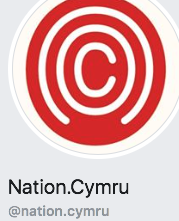
The article on NC criticising the concept of second homes, also appeared to have the Covid-19 lockdown in its sights, and began: “If it’s ‘coronavirus holiday’ season in rural Wales, the forecast is frosty for second home owners”, adding: “From spreading the virus and skipping lockdown to unfairly claiming business relief, second home owners have had bad pandemic press”.
But Mr Edwards is not alone, and The Eye have been given details of other worrying comments on Twitter by Welsh BBC broadcasters which appear to break the rules on impartiality as well.
One of the personalities is controversial for other reasons, too.
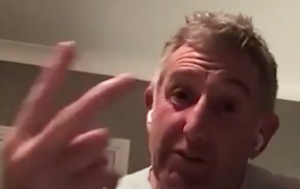
A shocked viewer of a recent ‘re-tweet’ of a message by Mr Davies, told us: “This seems close to being a Covid conspiracy theory now”.
The remark which was ‘retweeted’ by Mr Davies stated that “lockdowns are unnecessary”, and conspiracy theories have a long as well as disturbing history.

They are particularly relevant now following the US Presidential elections, after Donald Trump used conspiracy theories to allege that the Democrats ‘stole’ the election but providing no evidence to support his baseless charge that there was ‘mass fraud’.
Mr Davies has also been accused of being ‘misleading’, publishing ‘rubbish’ and ‘ranting’, after proclaiming on social media that contentious plans to re-develop a Cardiff cancer hospital would leave 60 per cent of a meadow available to walkers when campaigners say surveys have indicated all will be destroyed.
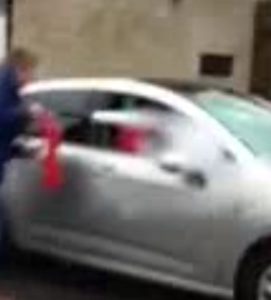
Contradicting him, one campaigner declared about the project to re-develop Velindre Hospital (which has now been approved): “The whole area will be bulldozed, £27 million of public money just to access this unsuitable site…”
Another cautioned: “Let’s talk Jonathan, not rant.”
Mr Davies (one of whose Twitter accounts is @JiffyRugby and includes ‘OBE’ after his name) is President of Velindre Fundraising, and demanded of one of the campaigners: “Have you or anyone close to you ever been unfortunate enough to have cancer?”.
But the advocate for a green space in that part of the city hit back, and said: “Absolutely yes, many of those opposing the site are current patients at Velindre”.

His, and Mr Edwards’, BBC colleague Emily Maitlis has also made news by retweeting a comment about quarantine by contentious journalist and broadcaster Piers Morgan.
She offered her opinions about Dominic Cummings who had hit the headlines by taking a trip to Barnard Castle during lockdown.
But Mr Edwards has made headlines himself, rather than just reading the news, by posting a picture of himself in front of a Welsh flag, which he was then ordered to remove, and by endorsing a columnist who writes that the BBC Proms make her feel like a “foreign tourist”.
This is all likely to prove a major headache for his superior Mr Davie whose rules emphasise the need to “maintain … impartiality”…

Tomorrow – why an anti-Semitic pressure group highlighted “the virile antisemitism” of a Welsh nationalist political party and the prejudice of its founder.
Our Editor Phil Parry’s memories of his astonishing decades-long, award-winning career in journalism (when impartiality was all-important) as he was gripped by the incurable neurological disabling condition Hereditary Spastic Paraplegia (HSP), have been released in a major book which was NOT funded by the BCW, ‘A GOOD STORY’. Order the book now!








